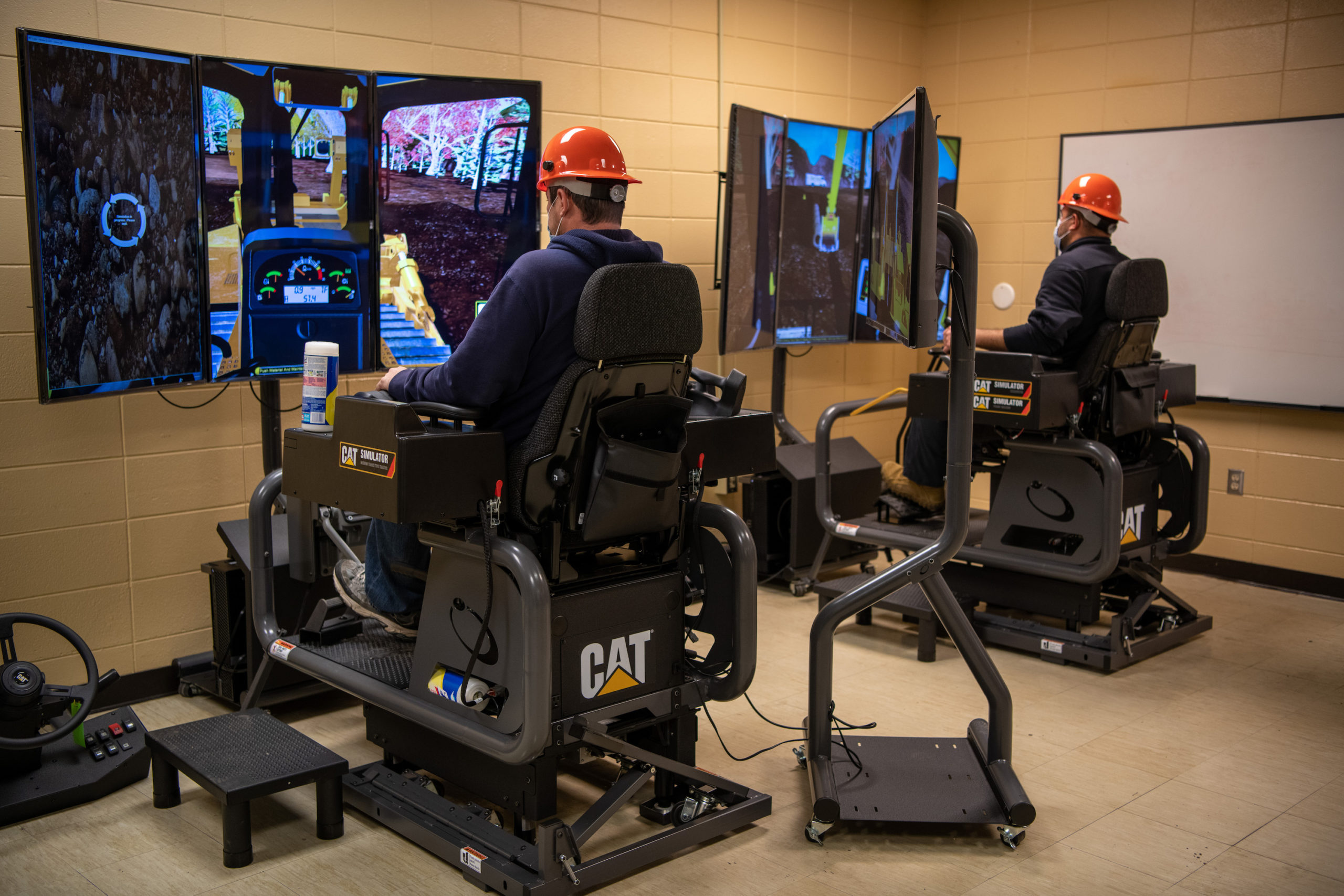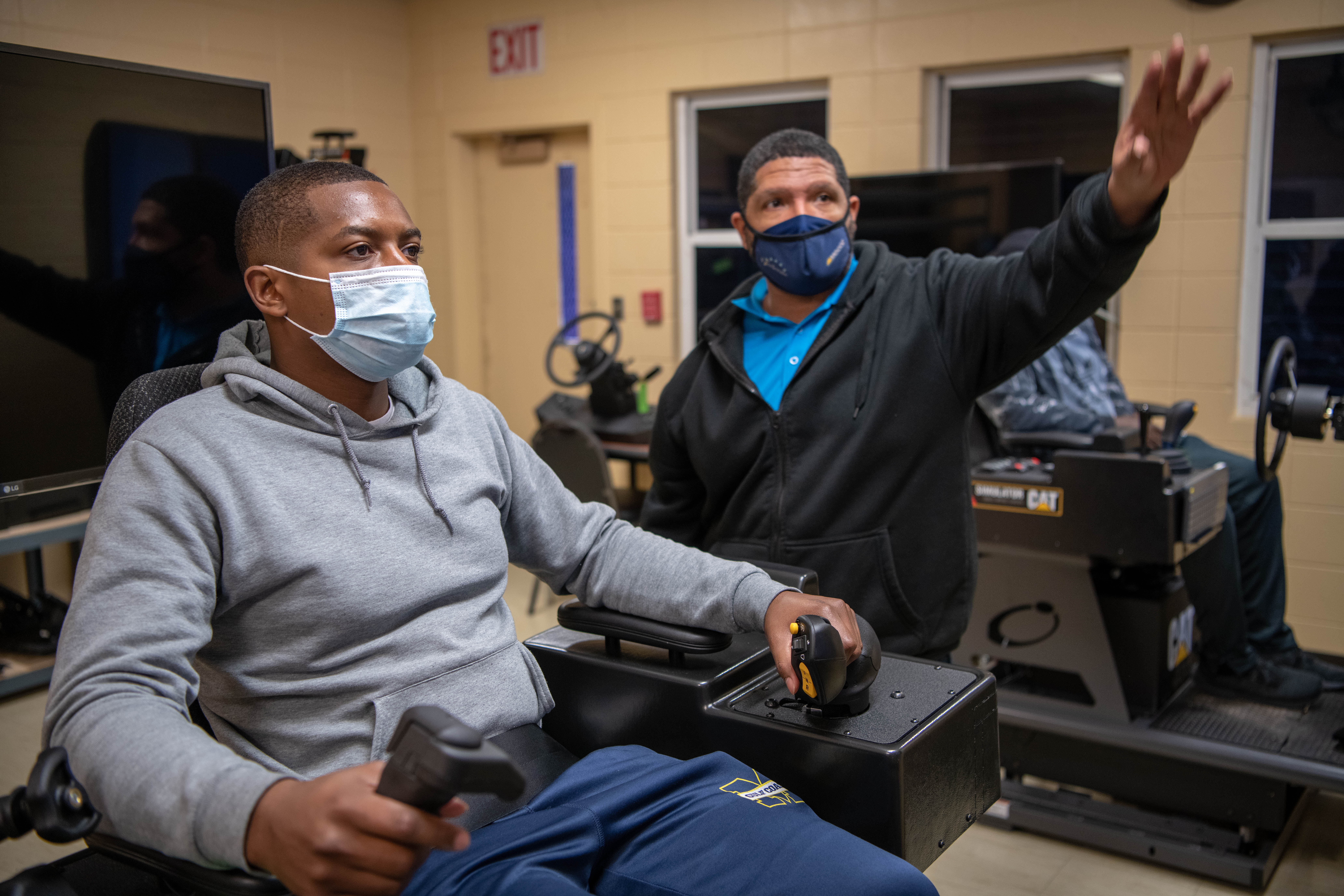MGCCC programs use state-of-the-art simulators to teach vital skills in high demand

Jaymien Malone and Bill Patton, students at Mississippi Gulf Coast Community College’s West Harrison County Center, are among many students currently using simulators in their industry-driven training programs. The simulators allow them to drive trucks, bulldozers, and other heavy equipment in a safe environment while learning to troubleshoot problems.
Heavy Equipment Maintenance Technology (Heavy Equipment), Commercial Truck Driving (CDL), and Maritime Multi-Craft Technology (Multi-Craft) programs at the college’s West Harrison County Center in Long Beach received simulators through the CARES Act.
“It’s pretty cool to use the simulators, and it’s not as easy as you think,” Malone said. “It helps to get the practice before you are on the road. It gives you the feel of the machinery and helps you learn how to use the controls.”
Patton agreed, adding, “I like that the instructors can set up different scenarios, allowing us to figure out problems we might actually face on the job. It’s learning, but fun at the same time.”
CDL instructor Kevin Collier said the simulators allow them to engage multiple students at once in performing skills training. “We have three trucks and three truck simulators, so we can work with six students at a time now, where in the past, we were limited to using just the actual trucks,” he said. “Another plus with the simulators is that we can use them no matter what the weather is like outside. They just make the training more valuable to our students, allowing them to practice skills more often and with a greater variety of scenarios than in the past.”
CDL is a an open-entry/open-exit program offered at two different times, one during the day and one in the afternoon/evening, so instructors are always working with new students. “I can set up a troubleshooting program on the simulator to assess current skills and work simultaneously with a group of students on multiple skill levels,” Collier said.
Lamont Davis, instructor in the Multi-Craft program, said the simulators help students in his program because they learn so many different skills and are able to become more successful with increased opportunity for hands-on training. “In the Multi-Craft program, students learn to work on marine engines and operate heavy equipment,” he said. “Because the marine engine portions of the program are very intensive, students could easily lose their skills knowledge on the equipment operation if we didn’t have the simulators for them to use on a regular basis.”
Sitting at a computer that controls three heavy equipment simulators, Chris Gentry, instructor in the Heavy Equipment program, sets up a variety of environmental conditions for his students to troubleshoot and overcome. Students work quietly, concentrating on operating equipment past hurdles visible on the screen.
“If you cannot operate a piece of equipment, you really can’t work on it,” Gentry said. “You have to be able to move vehicles around and test them to troubleshoot and work on them. The simulators make training students in this portion of the program so much more effective.”
He said they have actual equipment, such as bulldozers and forklifts, at the facility, but students learn the basic operational skills best on the simulators. “With the simulators, we can work with more students at one time and put them through a variety of scenarios that we really can’t provide on the actual equipment. Simulators are a safer alternative for students as they are learning the skills they need.”
Dr. Jonathan Woodward, Executive Vice President of Teaching and Learning, said simulators also provide mobility in training. “The heavy equipment operation simulators provide flexibility in how we train and where we train students because the simulators are mobile; they can be deployed to industry partners for on-location workforce training,” he said. “The additional equipment allows MGCCC to rapidly respond to industry needs in a manner that is both safe and cost-effective. We look forward to leveraging these simulators to offer immersive and robust learning experiences for students and trainees.”

